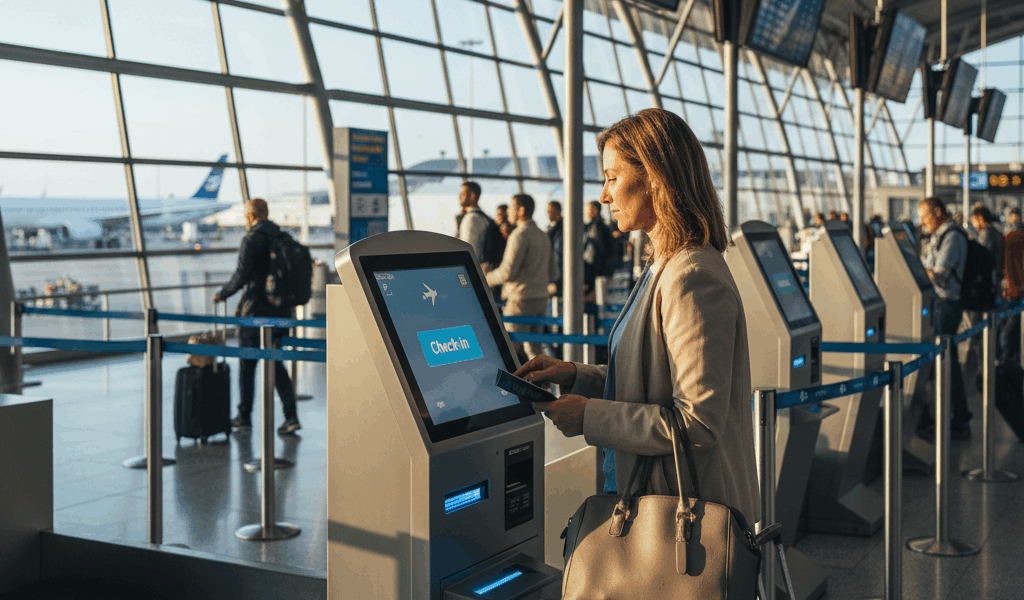Airport Kiosk
Air travel has transformed the way we move across the globe. Technological advancements have made this process smoother and more efficient. Airport kiosks play a significant role in this transformation. Let’s delve into the details, understanding their functions, benefits, and future potential.
Functions of Airport Kiosks
Airport kiosks serve several key functions designed to streamline passenger experiences. Self-service check-in is one of the most common uses. Travelers can check in for their flights, choose their seats, and print boarding passes without standing in long lines. Kiosks also handle baggage tagging. This self-service option speeds up the check-in process and reduces the burden on airline staff.
Some kiosks offer passport verification services. For international travelers, this function ensures that passport details are scanned and verified quickly, reducing wait times at counters. Boarding pass scanning at security checkpoints and boarding gates is another crucial role. It facilitates faster movement through security and boarding gates, contributing to reduced congestion.
Benefits of Airport Kiosks
Kiosks have several benefits for both passengers and airport staff. Self-service kiosks minimize wait times. Passengers can quickly complete check-in processes, reducing the need to wait in long lines. This convenience leads to a more pleasant airport experience.
- Efficiency: Kiosks increase operational efficiency. Airlines and airports can handle a higher volume of passengers with fewer staff. This efficiency translates to cost savings for airlines and improved service for passengers.
- Reduced Errors: Automated systems reduce the risk of human errors. Passengers entering their own information means fewer mistakes in names, passport numbers, and other critical data.
- Availability: Kiosks are available 24/7. Unlike check-in counters that operate on fixed schedules, kiosks are accessible any time of day. This constant availability is especially beneficial for travelers with early or late flights.
Integration with mobile and online services is another advantage. Kiosks complement online check-in systems and mobile apps. Passengers who check in online can use kiosks for baggage tagging and boarding pass printing. This integrated approach offers maximum flexibility and convenience.
Technological Features
Modern airport kiosks incorporate advanced technology to enhance user experience. Touchscreens with intuitive interfaces guide passengers through various procedures. These screens often support multiple languages, making them accessible for international travelers. Many kiosks have biometric systems for identity verification, using fingerprints or facial recognition.
Internet of Things (IoT) integration enables real-time data sharing. Kiosks connected to airport systems can offer up-to-date flight information, gate changes, and other critical notifications. This connectivity ensures passengers have current information throughout their journey.
Security Considerations
Security is paramount in airport operations. Kiosks contribute to maintaining high security standards. Biometric verification ensures that only authorized individuals can proceed. Secure Wi-Fi and data protocols protect passenger information from unauthorized access.
Regular software updates are critical. These updates ensure that kiosks operate smoothly and that any vulnerabilities are addressed promptly. Maintenance teams regularly check kiosks for hardware issues, ensuring consistent performance and security.
Challenges and Limitations
Despite their benefits, kiosks have some limitations. Technical issues can cause delays. Systems may occasionally crash or malfunction, leading to frustration for passengers. Regular maintenance mitigates these risks but doesn’t eliminate them entirely. Not all passengers are comfortable with self-service technology. Elderly individuals or those unfamiliar with digital interfaces may need assistance. Staff should be available to help, ensuring a smooth experience for all travelers.
Kiosks also require significant initial investment. While they save costs in the long term, the upfront cost of installing and maintaining multiple kiosks can be substantial. Balancing these costs with the expected efficiency improvements is crucial for airport management.
Environmental Impact
Kiosks can contribute to environmental sustainability. By reducing the need for printed boarding passes and manuals, they minimize paper waste. Energy-efficient designs and materials also lessen their environmental footprint. Many modern kiosks use low-power components, contributing to overall energy savings in airports.
Future Potential and Innovations
The future of airport kiosks promises further innovation. Integration with AI could offer even more personalized services. For example, AI could suggest travel tips or upgrade options based on passenger preferences. Enhanced biometric systems may further streamline security processes, reducing the need for manual checks.
Contactless technology is another growing trend. Post-pandemic, the importance of minimizing physical contact has increased. Kiosks with contactless capabilities for check-in and document scanning could become more prevalent. Voice-activated kiosks may also see wider use, accommodating a broader range of passengers’ needs and preferences.
Airport kiosks have reshaped the modern airport experience. They offer significant benefits in terms of efficiency, convenience, and security. By embracing technological advancements, airports can further enhance the functionality and capabilities of these essential tools.
“`



